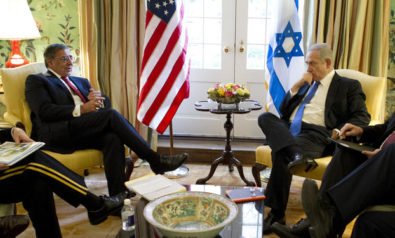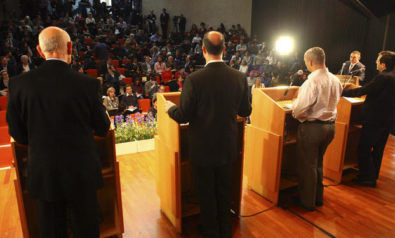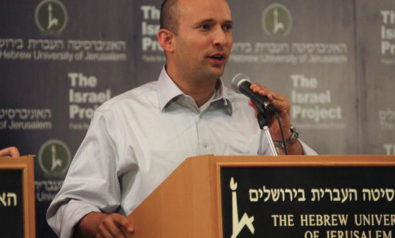The Israeli people voted for change and a normal life. An end to the occupation over the Palestinians and peace with their neighbors is a key to the possibility of living that normal life, argues Hillel Schenker. There is definitely an atmosphere of hope and possible change in the Israeli air, just after the surprising outcome of the 2013 elections. We know that Benjamin Netanyahu will once again be prime minister, but he and his right-wing Likud Party were seriously weakened by the results of the elections. His Likud Party, which ejected all of its moderate liberal Knesset members from the list in the party primaries, will only have 20 seats in the new Knesset out of 120. Although he has a flimsy right-wing majority of 61 seats against 59 for the center-left bloc, the last thing he would want to do is to form a government only with the extreme right-wing Yisrael Beiteinu and Jewish Home parties, together with two ultra-Orthodox parties. Thus he has no alternative but to base the next government on an alliance with the big surprise of the elections, media personality Yair Lapid’s centrist party, which won 19 seats. Longing for a Normal Life The name of the party, Yesh Atid/There is a Future (rhymes in Hebrew with his name Lapid), expresses the thrust of the 2013 elections. The desire of the majority of the Israeli public is to have hope for the future, and Lapid, in every one of the 400 columns he wrote in the daily Yediot Ahronot over the years, expressed variations on the theme of what it means for Israel to be a normal society. It means no messianic dreams of Jewish expansionist grandeur, but a secular, democratic Israel, nourished by its Jewish roots, and living a modern, tolerant, pluralistic life-style, where everyone has a chance and the burdens of civic responsibility are shared equally. Normalcy – that’s the catchword. And the amazing thing is that 60% of the people who voted for Lapid’s party only decided to do so during the last week of the elections. Impact of the Social Protest Movement In many respects the outcome of the elections are the fruits of the mass social protest movement of 2011, which called for social justice and a basic change in national priorities. Not only Lapid’s result, but also the rejuvenation of the Labor Party, which after declining to 8 seats when abandoned by Ehud Barak, recovered to 15 seats while incorporating some of the young protest movement leaders, Stav Shaffir and Student Union Head Itzik Shmuli, into its list; and the doubling of the left-Zionist Meretz Party’s strength from 3 to 6 seats after years of decline. Even the 6 seats won by Tzipi Livni’s new The Movement Party and the 2 seats won by Shaul Mofaz’s depleted Kadima Party are products of the protest. In his initial post-election statements, Lapid said that he wanted to focus on three topics: 1) An equal sharing of the burden – meaning comprehensive national service, either military of civilian, for all, including the ultra-Orthodox (10% of the population) and the Israeli-Arab citizens (20% of the population). 2) A fair deal for the middle class, including the lowering of the cost of housing (one of the primary goals of the protest movement). 3) Reforming the electoral system to ensure more stable governments. Netanyahu has belatedly accepted all three priorities as being important. What About the Palestinians? The elephant in the room is of course the peace process (or the lack of one); the relationship with the Palestinians. Only three parties put peace with the Palestinians at the top of their agenda: 1) Meretz, which formulated a concrete plan consisting of a recognition in principle of a Palestinian state in the West Bank, Gaza and East Jerusalem, supporting the UN General Assembly acceptance of Palestine as a non-member state, and replacing the Oslo Accords with a new agreement to be reached via negotiations between the Israeli government and the Palestinian government. 2) Former Foreign Minister Tzipi Livni’s party placed a resumption of political negotiations with the Palestinians at the top of their priorities. Livni was bolstered by number 2 and 3 on her list, former Labor Party leaders Amram Mitzna and Amir Peretz, who were upset by the fact that Labor Party leader Shelly Yachimovitz avoided the Palestinian question. 3) Hadash, the Communists and their allies, who get 90% of their votes from the Israeli-Arab population, and advocated their traditional two-states for two peoples position. A Two State Solution: Israel’s Calling Card Where does Lapid’s party stand on this issue? One indication is to look at the new 19 MKs from the party, all of whom will be first time Knesset members. Number two on Lapid’s list is modern Orthodox Rabbi Shai Piron, who has said that “a two-state solution is Israel’s calling card into the international community” to avoid isolation and a pariah status. Number three on his list is Herzliya Mayor Yael German, who was a member of Meretz (see the Meretz positions above); and number 5 on the list is former Shin Bet General Security Services head Ya’acov Peri, one of “the stars” of the Academy Award nominee documentary film “The Gatekeepers” – a must-see film for everyone concerned with the fate of Israel and the Israeli-Palestinian conflict – who says in the film that everyone who goes through the experience he had during his service “comes out a little more leftist”. Peri serves as the Chair of the Israeli Peace Initiative, an Israeli business, security and academic response to the Arab Peace Initiative. He emphasizes that Israel has a partner in PLO and PA head President Mahmoud Abbas, and he and Rabbi Piron say that it should do everything possible to renew negotiations. Lapid on the Settlers and Peace And what about Lapid himself? Here are some of the things that Lapid wrote about settlements and peace over the years, as collected by Haaretz correspondent Rotem Starkman: "If we don't give back most of the territories we will lose the Jewish majority in the country," and he even offered to trade the northern Tel Aviv suburb of Ramat Aviv in exchange for peace. "We're not afraid of their threats of civil war," Lapid wrote in reference to Jewish settlers in the territories, adding that Israeli political leaders were silenced by their threats. "Better a civil war now, when we can still control it." In a later column, his growing disappointment in the settlers prompted him to write, "There is no more fear of a civil war between brothers, because we're no longer brothers." Lapid went on, "If it weren't for the spectacle of thousands of settlers screaming and holding on to the land, Netanyahu would have made peace long ago. We're afraid of them." And finally, "Forget about peace, just obtain an agreement." Peace and a Normal Life: Now’s the Time This doesn’t guarantee that the next government will initiate a revival of negotiations. A week ago, that seemed impossible, and now, it might be conceivable, though still not likely. However, it does mean that the new Israeli government will be much more open to responding favorably to international initiatives to renew the negotiations and make progress towards an agreement. And all indications are that a clear majority of the Israeli public and its elected representatives would be ready to support a two state solution, with a Palestinian state based on the West Bank, Gaza and East Jerusalem, alongside the State of Israel, with mutually agreed upon land swaps, which would enable about 80% of the settlers to remain within Israel. The Israeli people voted for change and a normal life. And an end to the occupation over the Palestinians and peace with our neighbors is a key to the possibility of living that normal life. *[This article originally appeared in The Times of Israel.]
The views expressed in this article are the author's own and do not necessarily reflect Fair Observer’s editorial policy.
Support Fair Observer
We rely on your support for our independence, diversity and quality.
For more than 10 years, Fair Observer has been free, fair and independent. No billionaire owns us, no advertisers control us. We are a reader-supported nonprofit. Unlike many other publications, we keep our content free for readers regardless of where they live or whether they can afford to pay. We have no paywalls and no ads.
In the post-truth era of fake news, echo chambers and filter bubbles, we publish a plurality of perspectives from around the world. Anyone can publish with us, but everyone goes through a rigorous editorial process. So, you get fact-checked, well-reasoned content instead of noise.
We publish 2,500+ voices from 90+ countries. We also conduct education and training programs
on subjects ranging from digital media and journalism to writing and critical thinking. This
doesn’t come cheap. Servers, editors, trainers and web developers cost
money.
Please consider supporting us on a regular basis as a recurring donor or a
sustaining member.
Will you support FO’s journalism?
We rely on your support for our independence, diversity and quality.












Comment